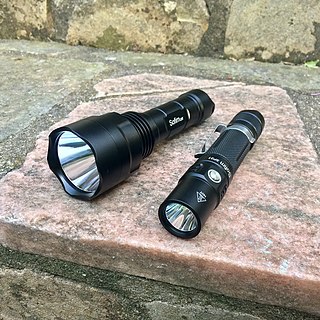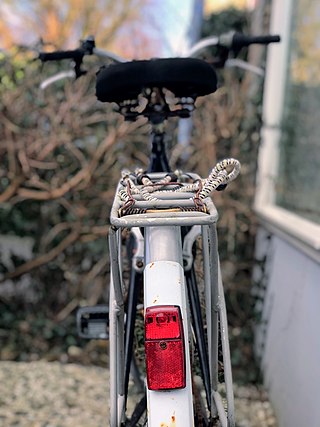Related Research Articles

An electric light, lamp, or light bulb is an electrical component that produces light. It is the most common form of artificial lighting. Lamps usually have a base made of ceramic, metal, glass, or plastic which secures the lamp in the socket of a light fixture, which is often called a "lamp" as well. The electrical connection to the socket may be made with a screw-thread base, two metal pins, two metal caps or a bayonet mount.

Stage lighting is the craft of lighting as it applies to the production of theater, dance, opera, and other performance arts. Several different types of stage lighting instruments are used in this discipline. In addition to basic lighting, modern stage lighting can also include special effects, such as lasers and fog machines. People who work on stage lighting are commonly referred to as lighting technicians or lighting designers.

Lighting or illumination is the deliberate use of light to achieve practical or aesthetic effects. Lighting includes the use of both artificial light sources like lamps and light fixtures, as well as natural illumination by capturing daylight. Daylighting is sometimes used as the main source of light during daytime in buildings. This can save energy in place of using artificial lighting, which represents a major component of energy consumption in buildings. Proper lighting can enhance task performance, improve the appearance of an area, or have positive psychological effects on occupants.

A lantern is an often portable source of lighting, typically featuring a protective enclosure for the light source – historically usually a candle, a wick in oil, or a thermoluminescent mesh, and often a battery-powered light in modern times – to make it easier to carry and hang up, and make it more reliable outdoors or in drafty interiors. Lanterns may also be used for signaling, as torches, or as general light-sources outdoors.

A flashlight or electric torch, usually shortened to torch, is a portable hand-held electric lamp. Formerly, the light source typically was a miniature incandescent light bulb, but these have been displaced by light-emitting diodes (LEDs) since the early 2000s. A typical flashlight consists of the light source mounted in a reflector, a transparent cover to protect the light source and reflector, a battery, and a switch, all enclosed in a case.

A sodium-vapor lamp is a gas-discharge lamp that uses sodium in an excited state to produce light at a characteristic wavelength near 589 nm.

Bicycle lighting is illumination attached to bicycles whose purpose above all is, along with reflectors, to improve the visibility of the bicycle and its rider to other road users under circumstances of poor ambient illumination. A secondary purpose is to illuminate reflective materials such as cat's eyes and traffic signs. A third purpose may be to illuminate the roadway so that the rider can see the way ahead. Serving the latter purposes require much more luminous flux and thus more power.

A mechanically powered flashlight is a flashlight that is powered by electricity generated by the muscle power of the user, so it does not need replacement of batteries, or recharging from an electrical source. There are several types which use different operating mechanisms. They use different motions to generate the required power; such as squeezing a handle, winding a crank, or shaking the flashlight itself. These flashlights can also be distinguished by the technique used to store the energy: a spring, a flywheel, a battery or a capacitor.

A light fixture, light fitting, or luminaire is an electrical lighting device containing one or more light sources, such as lamps, and all the accessory components required for its operation to provide illumination to the environment. All light fixtures have a fixture body and one or more lamps. The lamps may be in sockets for easy replacement—or, in the case of some LED fixtures, hard-wired in place.

Landscape lighting or garden lighting refers to the use of outdoor illumination of private gardens and public landscapes; for the enhancement and purposes of safety, nighttime aesthetics, accessibility, security, recreation and sports, and social and event uses.

A solar lamp, also known as a solar light or solar lantern, is a lighting system composed of an LED lamp, solar panels, battery, charge controller and there may also be an inverter. The lamp operates on electricity from batteries, charged through the use of a solar photovoltaic panel.

Solar street lights are raised light sources which are powered by solar panels generally mounted on the lighting structure or integrated into the pole itself. The solar panels charge a rechargeable battery, which powers a fluorescent or LED lamp during the night.

Solar traffic lights are signalling devices powered by solar panels positioned at road intersections, pedestrian crossings and other locations to control the flows of traffic. They assign the right of way to road users by the use of lights in standard colors, using a universal color code.
A light tower is a piece of mobile equipment which has one or more high-intensity electric lamps and a mast. Almost always, the lights are attached to the mast, which is attached to a trailer, with a generator set to power the lamps. Normally the lamps are metal halide bulbs and the generator is powered by a diesel engine. However, battery-powered, solar-powered and hydrogen-powered sets are available; light towers with electrodeless lamps lighting are also sold. Modular kits permit separation of the generator set, trailer, lights and mast from each other. Another variation is an inflatable mast. Particularly when an inflatable mast is used, the lights may be placed close to the ground, with a reflector attached to the mast. When soft lighting is wanted, an inflatable "balloon" diffuser may be used. An inflatable mast may serve as a diffuser.

A dive light is a light source carried by an underwater diver to illuminate the underwater environment. Scuba divers generally carry self-contained lights, but surface supplied divers may carry lights powered by cable supply.

BioLite is a New York City-based startup company that produces off-grid energy products for outdoor recreational use and emerging markets. The company is known for its wood-burning stoves that use thermoelectric technology to create usable electricity from the heat of their fires. It was founded in 2006.
LuminAID is an emergency lighting company and the name of its key product, a solar-rechargeable light that packs flat and inflates to diffuse light like a lantern. LuminAID technology was invented in 2010 by Anna Stork and Andrea Sreshta. The company is based in Chicago.

Solight Design is an American company that manufactures portable solar lanterns intended to provide lighting in disaster areas and to people who otherwise have no access to electricity. It was co-founded by architecture professor Alice Min Soo Chun. She designed the company's signature product, the SolarPuff lantern, which is based on an earlier product created by Chun and some of her students at the Columbia Graduate School of Architecture.
There are many practical applications for solar panels or photovoltaics. From the fields of the agricultural industry as a power source for irrigation to its usage in remote health care facilities to refrigerate medical supplies. Other applications include power generation at various scales and attempts to integrate them into homes and public infrastructure. PV modules are used in photovoltaic systems and include a large variety of electrical devices.
References
- ↑ "Travel gadget: Luci solar-powered light". Mercury News.
- ↑ "Gear: An inflatable camp light is slight but powerful". LA Times.
- ↑ "This Little Solar Powered Lantern Named 'Luci' Is Having A Big Impact". Forbes.
- ↑ "This inflatable, solar-powered light is a must-have for your next trip outdoors". Business Insider.
- ↑ "DoneGood". Mashable.
- 1 2 "A solar solution for 1.2 billion people without electric light". The Verge.
- ↑ "How Texans are Providing Power Around the World". Texas Monthly.
- ↑ "MPOWERD and The Salvation Army Partner to Provide a Light in the Darkness". Salvation Army.
- ↑ "MPOWERD". Dumbo. 2018-11-05. Retrieved 2022-06-09.
- ↑ Kopernik. "Luci in The Sky Like Diamonds..." Kopernik | Finding What Works. Retrieved 2022-06-09.
- ↑ "MPOWERD INC. Trademarks (4) from Trademarkia - page 1". www.trademarkia.com. Retrieved 2022-06-09.
- ↑ "100 of the most exciting startups in New York City". Business Insider. Retrieved 2022-06-09.
- ↑ "Direct Energy's Give Brighter Program has Brought Light to 45,000 People". Business Insider.
- ↑ "MPOWERD-Outdoor-Solarlaterne Luci Outdoor 2.0". Petri Heil.
- ↑ Wollerton, Megan. "The star of my recent camping trip? This $25 solar lantern". CNET. Retrieved 2022-06-09.
- ↑ "The best rechargeable flashlights to light up the night". Task & Purpose. 2021-12-24. Retrieved 2022-06-09.
- ↑ "1.6 Billion People In The World Don't Have Electricity — So Here's A Cool Solar-Powered Light Called 'Luci'". Business Insider.
- ↑ Campbell, Ian (28 March 2022). "These OXO cleaning tools are a game-changer for cleaning filthy gadgets". Input. Retrieved 2022-06-09.
- ↑ US10180221B1,Jeong, Seungah; Salzinger, John& Mailmail, Mehmet,"Modular solar-powered lighting devices and components thereof",issued 2019-01-15
- ↑ US9182090B2,MUEHLEMANN, Michael; Snyder, Jason Alan& KHATTAB, Karim,"Solar powered lamp",issued 2015-11-10
- ↑ "Espacenet – search results". worldwide.espacenet.com. Retrieved 2022-06-09.
- ↑ US9080736B1,Salzinger, John&MUEHLEMANN, Michael,"Portable solar-powered devices",issued 2015-07-14
- ↑ US10704746B2,Jeong, Seungah&Salzinger, John,"Portable lighting devices with wireless connectivity",issued 2020-07-07
- 1 2 3 4 5 "Outdoor and Backyard Lighting We Love". The New York Times. 13 May 2022. ISSN 0362-4331 . Retrieved 2022-06-09.
- ↑ World, Yachting (2022-04-07). "Boat galley accessories: essential cooking tools for cruising sailboats". Yachting World. Retrieved 2022-06-09.
- ↑ "The 4 Best Headlamps and Lights of 2021". Backpacker. 2021-03-23. Retrieved 2022-06-09.
- ↑ Murphy, Mary (21 January 2021). "Emerging Gear: Pocket-Size Sharpener, 'Popeye' Gear, and More". GearJunkie. Retrieved 2022-06-09.